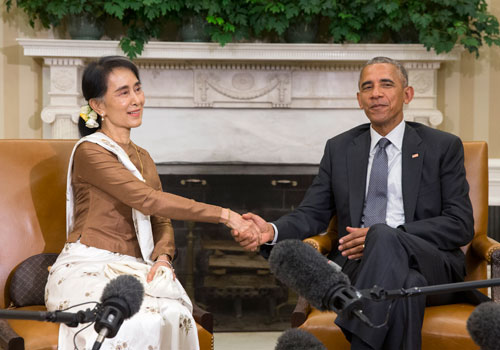-
Tips for becoming a good boxer - November 6, 2020
-
7 expert tips for making your hens night a memorable one - November 6, 2020
-
5 reasons to host your Christmas party on a cruise boat - November 6, 2020
-
What to do when you’re charged with a crime - November 6, 2020
-
Should you get one or multiple dogs? Here’s all you need to know - November 3, 2020
-
A Guide: How to Build Your Very Own Magic Mirror - February 14, 2019
-
Our Top Inspirational Baseball Stars - November 24, 2018
-
Five Tech Tools That Will Help You Turn Your Blog into a Business - November 24, 2018
-
How to Indulge on Vacation without Expanding Your Waist - November 9, 2018
-
5 Strategies for Businesses to Appeal to Today’s Increasingly Mobile-Crazed Customers - November 9, 2018
Obama sets timetable to lift Myanmar sanctions
President Barack Obama, in the closing months of his presidency, and Hillary Clinton, in the final stretch of her presidential campaign, both heralded the visit by a democratic Myanmar leader as proof their engagement strategy (initiated in 2012 when Clinton was secretary of state) has paid off. Normalising ties with Myanmar (along with Washington’s lifting of its arms embargo on Vietnam) has been one of the few concrete diplomatic coups achieved under the overall USA strategy of “rebalancing” to Asia. “I want our military to be an honourable institution and capable of protecting and defending our rights. but we do not think, politics is a place for the military”, she said, adding that her government would continue to work to make the Constitution truly democratic.
Advertisement
USA companies have been watching closely for any sign they’ll get more access to the fast-growing Southeast Asian nation, known as Burma before its former military rulers changed the name to Myanmar in 1989.
Delphine Schrank, journalist and author of the Rebel of Rangoon, said that the U.S. has been “phasing” out sanctions, and while the business community in Myanmar and the USA would like them removed entirely, there is an understanding within Aung San Suu Kyi’s party and the United States government that the “game is not over” yet in the transition process.
Speaking at the same forum, Aung San Suu Kyi said her government was “not afraid of sanctions”, and supported the minimal changes that had been made the previous week.
Obama administration officials have argued that freeing Myanmar from economic sanctions need not wait until the country liberalizes entirely, and that doing so will improve the chances that democracy will take hold there.
Obama stated that the United States is ready to lift the aforementioned sanctions “soon”, the lifting will be an incentive for companies to invest in the country in the future.
The Council on American-Islamic Relations (CAIR), the largest Muslim civil rights and advocacy organization in the U.S., released a statement on Wednesday calling on Obama to maintain all current sanctions until the citizenship rights of Rohingya Muslims in Myanmar are respected. The biggest obstacle to US investment is the Treasury Department’s Specially Designated Nationals blacklist of individuals, he said. Global Witness said Tuesday that US industry lobbying to roll back sanctions before critical reforms have kicked in risks undoing the country’s fragile progress to democracy.
The US sanctions, imposed 20 years ago in a bid to put pressure on the former military regime, bar Americans from dealing with anyone on its blacklist of more than 100 people and companies linked to the former junta.
Caterpillar, a US heavy machine giant, has pushed since 2012 for fewer restrictions on activity in Myanmar.
Of particular concern is the country’s infamous jade industry, dominated by former junta members, their associates, and the military holding company Union of Myanmar Economic Holdings Limited. Referring to the transition of Burma to elections, Obama said the new government is giving voice to the hopes and dreams to new generation of Burmese people.
From a business perspective, sanctions legislation remains complex, and its piecemeal suspension rather than removal has inhibited many United States firms from considering market entry.
In November, when Suu Kyi was elected to her post, the USA removed certain government-run businesses and some banks from a blacklist in an attempt to jump-start trade.
Although some curbs on ties to the military will probably stay in place, Obama’s move is expected to bring greater clarity to USA companies considering business in the emerging nation. This prioritisation says much about her pragmatic foreign policy. The U.S. had cited Myanmar’s refusal to recognize workers’ rights.
The US eased some sanctions earlier this year to support political reform, but maintained most of its economic restrictions with an eye towards penalising those it views as hampering Aung San Suu Kyi’s democratically elected government.
In addition, the White House on Wednesday advised Congress that America would offer preferential trade benefits to Myanmar that have been suspended since 1989, one year after the violent crackdown by the military.
Suu Kyi said she wanted USA companies to bring investment “best practices” and urged them to report any signs of corruption.
The U.S.is working to help Myanmar grow its economy through increased aid, promoting a healthy environment for trade and investment and taking steps to relax sanctions, Ben Rhodes, White House deputy national-security adviser, told reporters last week at a briefing in Laos.
“We are honest in trying to bring together the different communities”, Suu Kyi said.
Advertisement
Aung San Suu Kyi meeting with Obama at the White House comes after a decades-long journey from political prisoner to Myanmar’s national leader.





























